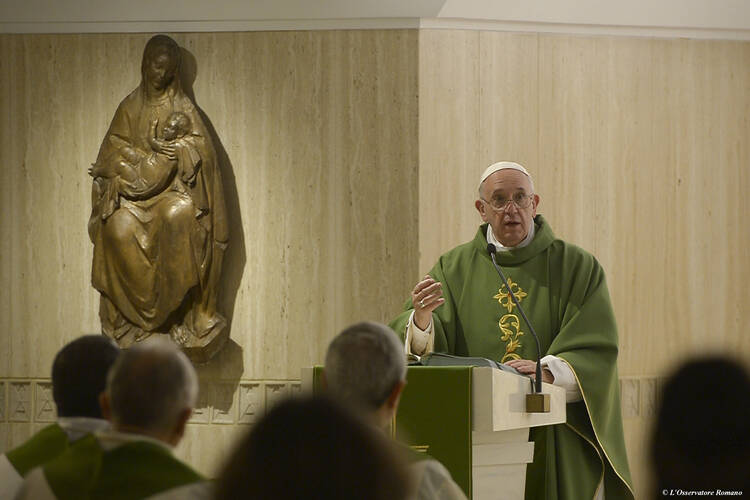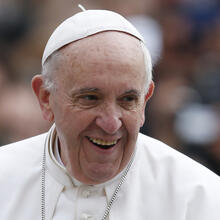Humility is the way of holiness. That’s what Pope Francis said in his Homily at Monday morning’s Mass at the Casa Santa Marta. The pope focused on the story of King David who, aware of his own sin, accepts humiliation in a spirit of trust in the Lord. While God forgives sin, the pope observed, “the wounds of corruption are difficult to heal."
King David "is one step away from corruption," says the pope - but the prophet Nathan, sent by God, makes him understand the evil he has done. David, adds Francis, is a "sinner, but holy."
Though he is a sinner, David is not corrupt - the pope notes - because "the corrupt do not realize that they are."
"It takes a special grace to change the heart of a corrupt person. And David who had a noble heart, said: 'Oh, it's true: I have sinned!' He acknowledges his guilt. And what does Nathan say? 'The Lord forgives your sin, but the corruption that you have sown will grow. You killed an innocent man to hide adultery. The sword shall never depart from your house.' God forgives the sin; David converts but the wounds of corruption are difficult to heal. We see this in many parts of the world."
David finds his son Absalom has become corrupt, waging war on him. But the king gathers his men and decides to leave the city, allowing the Ark to return. He does not call on God to defend him. He leaves "to save his people." And this, Pope Francis reveals, “is the way of holiness that David, after that moment of corruption, begins to follow."
David, with covered head and weeping, leaves the city amid the jeers of some. Among these, Shimei calls him "murderous" and curses him. David accepts this because, the pope says, if he is cursed, it is the Lord’s doing:
"Then David said to his servants: 'My own son, who came forth from my loins, is seeking my life:’ Absalom. And then, ‘let this Benjaminite go on cursing since it was the Lord who ordered him to.’ David knows how to see the signs: it is his moment of humiliation; it is the moment in which he is paying for his guilt. 'Perhaps the Lord will look upon my affliction, and make it up to me with benefits for the curses he is uttering this day.’ And he puts himself in the hands of the Lord. This is the path of David, from the moment of corruption to this entrusting of himself into the hands of the Lord. And this is holiness. This is humility.”
“I think all of us, if somebody says something bad to us, would immediately say that it’s not true." Or we do as Shimei does: "We offer an even uglier response."
"Humility,” the pope stresses, “can only get into the heart via humiliation. There is no humility without humiliation, and if you are not able to put up with some humiliations in your life, you are not humble." It’s simply "mathematical," the pope stresses:
"The only way to humility is through humiliation. David’s destiny, which is holiness, comes through humiliation. The destiny of that holiness which God gives to his children, gives to the Church, comes through the humiliation of his Son, who allows himself to be insulted, who allows himself to be placed on the cross - unjustly ... And this Son of God who humbles himself, this is the way of holiness. And David, through his behavior, prophesizes this humiliation of Jesus. Let us ask the Lord for the grace of humility for each of us, for the whole Church - but also for the grace to understand that humility cannot be achieved without humiliation."








